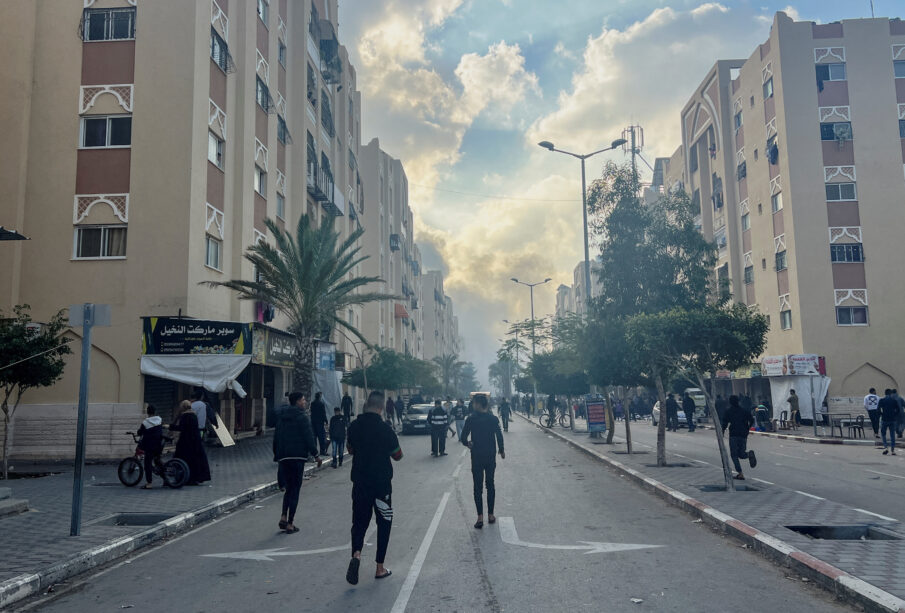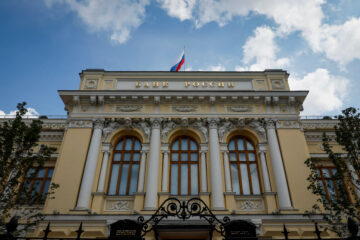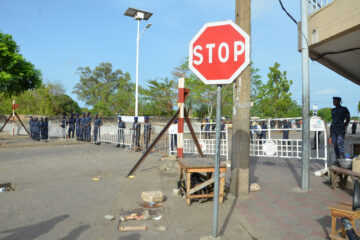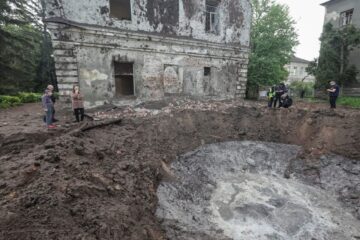Israel launches strikes on Gaza as fighting resumes after truce expires
 Palestinians run following an Israeli strike, after a temporary truce between Hamas and Israel expired, in Khan Younis in the southern Gaza Strip, December 1, 2023. REUTERS/Saleh Salem
Palestinians run following an Israeli strike, after a temporary truce between Hamas and Israel expired, in Khan Younis in the southern Gaza Strip, December 1, 2023. REUTERS/Saleh SalemBy Nidal Al-Mughrabi and Suhaib Salem Reuters
Israel resumed combat operations against Hamas in Gaza on Friday after accusing the Palestinian militant group of firing rockets at Israel and reneging on a deal to free all women held as hostages, violating their temporary truce agreement.
The seven-day pause, which began on Nov. 24 and was extended twice, had allowed for the exchange of dozens of hostages held in Gaza for hundreds of Palestinian prisoners and facilitated the entry of humanitarian aid into the shattered coastal strip.
In the hour before the truce was set to end at 7 a.m. (0500 GMT), Israel said it intercepted a rocket fired from Gaza.
There was no immediate comment from Hamas or claim of responsibility for the launch.
“With the resumption of fighting we emphasise: The Israeli government is committed to achieving the goals of the war – to free our hostages, to eliminate Hamas, and to ensure that Gaza will never pose a threat to the residents of Israel,” the office of Israeli Prime Minister Benjamin Netanyahu said in a statement.
Hamas was also defiant.
“What Israel did not achieve during the fifty days before the truce, it will not achieve by continuing its aggression after the truce,” Ezzat El Rashq, a member of the Hamas political bureau, said on the group’s web site.
Palestinian media and Gaza’s interior ministry reported Israeli air and artillery strikes across the enclave after the truce expired, including in Rafah, near the border with Egypt.
In Khan Younis, in the southern Gaza Strip, a Reuters witness said he could hear heavy shelling and see smoke rising in the east of the town. People were fleeing the area to camps in the west of Khan Younis for cover, he added.
Al-Jazeera reported a number of people had been killed and injured by Israeli raids and shelling.
The Israel military confirmed its jets were striking Hamas targets in Gaza.
Images on social media showed large plumes of dark smoke rising over the densely built-up Jabalia camp in Gaza.
Israel has sworn to annihilate Hamas, which rules Gaza, in response to the Oct. 7 rampage by the militant group, when Israel says gunmen killed 1,200 people and took 240 hostages.
Israel retaliated with intense bombardment and a ground invasion. Palestinian health authorities deemed reliable by the United Nations say more than 15,000 Gazans have been confirmed killed.
HOSTAGES HEAD HOME
Qatar and Egypt had been making intensive efforts to extend the truce following the exchange on Thursday of the latest batch of eight hostages and 30 Palestinian prisoners.
Israel had previously set the release of 10 hostages a day as the minimum it would accept to pause its ground assault and bombardment.
Thursday’s releases brought the totals freed during the truce to 105 hostages and 240 Palestinian prisoners.
Among those released were six women aged 21 to 40 including one Mexican-Israeli dual national and 21-year-old Mia Schem, who holds both French and Israeli citizenship.
Photos released by the Israeli prime minister’s office showed Schem, who was captured by Hamas along with others at an outdoor music festival in southern Israel on Oct. 7, embracing her mother and brother after they were reunited at Hatzerim military base in Israel.
The other two newly released hostages were a brother and sister, Belal and Aisha al-Ziadna, aged 18 and 17 respectively, according to the Israeli prime minister’s office. They are Bedouin Arab citizens of Israel and among four members of their family taken hostage while they were milking cows on a farm.
One of Qatar’s lead negotiators, career diplomat Abdullah Al Sulaiti, who helped broker the truce through marathon shuttle negotiations, acknowledged in a recent Reuters interview the uncertain odds of keeping the guns silent.
“At the beginning I thought achieving an agreement would be the most difficult step,” he said in an article that detailed the behind-the-scenes efforts for the first time. “I’ve discovered that sustaining the agreement itself is equally challenging.”
ISRAEL AGREES TO PROTECT CIVILIANS, BLINKEN SAYS
The truce had allowed some humanitarian aid into Gaza after much of the coastal territory of 2.3 million people was reduced to wasteland in the Israeli assault.
More fuel and 56 trucks of humanitarian supplies entered Gaza on Thursday, Israel’s defence ministry and the Palestinian Red Crescent Society said.
But deliveries of food, water, medical supplies and fuel remain far below what is needed, aid workers say.
At an emergency meeting in Amman, Jordan’s King Abdullah on Thursday urged U.N. officials and international groups to pressure Israel to allow more aid into the beleaguered enclave, according to delegates.
When the ceasefire first came into effect a week ago, Israel was preparing to turn the focus of its operation to southern Gaza after its seven-week assault to the north.
U.S. Secretary of State Antony Blinken, in Israel during his third visit to the Middle East since the war began, did not comment on the resumption of fighting as he headed for Dubai.
On Thursday, Blinken said he told Netanyahu Israel cannot repeat in south Gaza the massive civilian casualties and displacement of residents it inflicted in the north.
“We discussed the details of Israel’s ongoing planning and I underscored the imperative for the United States that the massive loss of civilian life and displacement of the scale that we saw in northern Gaza not be repeated in the south,” Blinken told reporters in Tel Aviv, adding the Israeli government had agreed.









